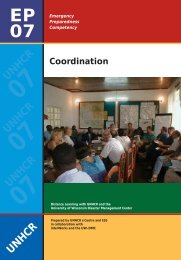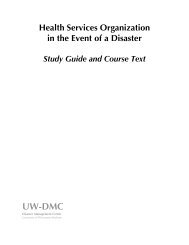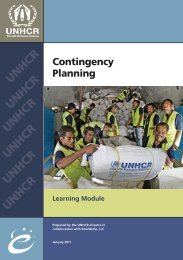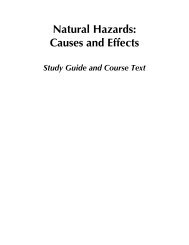Managing External Relations - Disaster Management Center ...
Managing External Relations - Disaster Management Center ...
Managing External Relations - Disaster Management Center ...
You also want an ePaper? Increase the reach of your titles
YUMPU automatically turns print PDFs into web optimized ePapers that Google loves.
EP<br />
04<br />
82<br />
<strong>Managing</strong> <strong>External</strong> <strong>Relations</strong><br />
Establish means by which collaboration will be promoted in the following areas, and<br />
others as appropriate:<br />
♦ Joint assessment of local capacities and needs<br />
♦ Agreement on services and standards of assistance<br />
♦ The Consolidated Appeal Process or other forms of joint resource mobilisation<br />
♦ Negotiation related to access to emergency areas<br />
♦ Capacity building for local institutions and organisations<br />
♦ Joint training programs<br />
♦ Joint strategic planning and programming for:<br />
– Preparedness and contingency planning<br />
– Sharing personnel<br />
– Sharing operations support resources<br />
(4) Identify staff knowledge and skills that exist and those that need to be developed for<br />
improved external relations, such as:<br />
♦ An up-to-date and in-depth knowledge and analysis of political and social issues<br />
♦ An understanding of international protection laws, protection issues, and<br />
mandates of UNHCR<br />
♦ An awareness of national priorities and needs<br />
♦ An understanding of agencies’ goals, activities and relationships in the network<br />
♦ An awareness of changes in the international response system<br />
♦ An understanding of situations and needs in the field<br />
(5) Establish a timeline for accomplishing goals including meetings, briefings and staff<br />
development in facilitation, negotiation, presentation and other required skills.<br />
Recommended reading for development of an external relations strategy<br />
UNHCR Publications<br />
UNHCR Emergency Handbook, 1998.<br />
Partnership: A Programme <strong>Management</strong> Handbook for UNHCR’s Partners, March 1996.<br />
The State of the World’s Refugees, The Challenge of Protection, UNHCR, 1993.<br />
The State of the World’s Refugees 1997-98: A Humanitarian Agenda, 1997.<br />
UNDP-DHA <strong>Disaster</strong> <strong>Management</strong> Training Programme Publications<br />
Co-ordination Among International Organisations in Complex Emergencies, 1997.<br />
Emergency Information <strong>Management</strong> and Telecommunications, 1997.<br />
Developing a Pro-Active Media <strong>Relations</strong> Strategy<br />
A media relations strategy is necessary in order to get the best results from UNHCR’s relationships<br />
with the media. This strategy will only be effective, however, if you have something of value to say to<br />
the media. What is of substance will be dependent on the context in which you are working. Plainly,<br />
advocacy of refugee protection principles and basic human rights issues, will be important in almost<br />
all cases. Beyond that, contingency planning situations might require messages about the need for<br />
common ground and mutual preparedness for possible refugee influxes or displacements. Active<br />
emergency situations may require up to date assessment information and reporting on critical needs.<br />
As an active or potential emergency manager you must develop your strategy to meet current needs<br />
as well as those that might arise if an emergency operation is needed.








